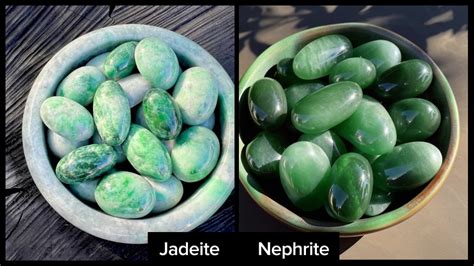“Alphonse had, over the years, amassed a lovely collection of samples of jade and oriental jade carvings, but by the time he came across the carved dragon, he was so jaded he hardly glanced at it twice.”
There are not two, but three different “jades” in that sentence! The first thing to know about jade is that while it’s a kind of stone (usually green), there are really two different kinds of green stone, both of which are called jade. Calling one of them “jade” is slightly illegitimate, though. The “real” jade is a “silicate of lime and magnesia” (a silicate is any sort of mineral with silica in it). It can be blue or white instead of green, and it’s typically somewhat translucent. The other “jade” is lighter green and formed from sodium and aluminum. It’s called “jade,” “oriental jade,” “oceanic jade,” and its more formal name “jadeite.”
Jade got its name in an unusual way; “jade” comes from the Latin word “ilia”, which has to do with the kidneys. This seems to be because a couple of millennia ago people thought the substance would cure kidney problems. It’s not at all clear where that idea could have arisen, because there isn’t anything about jade that interacts with kidneys, unless you get whacked in the side with a big slab of the stuff. But the notion was widespread enough to give jade another name: “nephrite,” which is from the Greek word for kidneys.
Sometimes it’s puzzling how the human race managed to survive some of the inane beliefs its members have sworn by at various times in history. “Jade fixes kidneys.” “If you’re sick then you must just have too much blood; hold still.” “Supply-side economics is a real thing.” There are countless examples of this nonsense. It’s enough to make you feel pretty jaded. Which, by the way, is a word not related to any sort of stone called “jade.” “Jade” meaning world-weary comes from the 1300s, and probably comes from the Old Norse word “jalda,” which meant “mare” as in “female horse.” (Have you noticed that I try to find words with weird etymologies?) Anyway, when it showed up in English, “jade” still meant a horse but primarily a work horse who’s old and tired. Since English was primarily being used by humans (and here’s another example of being jaded), the word came to be used to describe people who were looked down on — or possibly it was a good word to use to describe people you wanted to look down on, and calling them “old worn-out horses” was a convenient way to do that. In any case, by the 1700s women of low social status were called “jades.”
“Jade” also had a verb form, and it went through a similar evolution. It appeared in the 1600s and meant “to exhaust a horse,” and a century later it came to be applied to people. The verb form lacked the derogatory sense of the noun, though; it just meant “to become tired, exhausted, or dull.” That’s the sense of the word that survives today. Anyone who’s “jaded” has seen so many offensive, thoughtless, or scandalous things that their sense of excitement, interest, or outrage has become exhausted. It’s often used in a slightly sardonic sense, as in this quote from the National Post in 2013: “Call me jaded, but in a year that brings Oblivion, After Earth, World War Z, Pacific Rim, The World’s End and Smurfs 2, not just any old apocalypse will do.”

